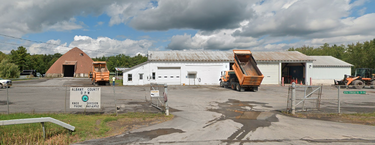Are town and county headed for agreement to share salt shed?
KNOX — Winter is on the horizon and Knox wants to be ready with road salt.
This past winter, Knox had disagreed with Albany County’s accusation that the town misappropriated $18,000 worth of road salt and then hired a lawyer to make its case.
In a March 18 letter, a lawyer for the county had written to the town that, if Knox failed to pay within seven days of receiving the letter, the county would deduct the $18,000 from the town’s sales-tax disbursement.
The town has used the county salt shed for years, with the amounts of salt tracked by the drivers who load it into their trucks. Knox Supervisor Russell Pokorny told The Enterprise in March that “even if the logging is sloppy,” the town had purchased enough salt that the $18,000 demanded by the county is an invalid figure.
Pokorny told the Knox Town Board members at their Aug. 19 meeting that Albany County’s lawyer isn’t responding to the lawyer the town hired and that it is too late now for the town to build a salt shed of its own “so we’re going to have to share.”
County spokeswoman Mary Rozak responded on Aug. 22 to Enterprise questions with this statement: “Albany County had had conversations with the law firm representing the town of Knox. We will continue to discuss resolution of the pending discrepancies of the past year to reach the best resolution for Albany County taxpayers.”
Hours after The Enterprise spoke to Rozak on Aug. 22, Pokorny received a text from Knox’s lawyer saying the county lawyer wants to schedule a meeting for next Wednesday or Thursday morning to work out a plan to share the salt shed.
“We will talk through the issue then arrange a site visit at the salt facility to walk through a plan,” the text said. “From there he [the county’s lawyer] and I will draft a new agreement between Knox and County.”
Pokorny had told the town board on Aug. 19, “I’m looking for an apology” and to have the town’s legal expenses covered; Knox is paying its lawyer $250 an hour.
Pokorny had estimated in March that building a new shed would cost between $50,000 and $60,000, according to recent bids.
He said on Aug. 19, “We need a couple-year agreement if we’re going to build another salt shed.”
Knox Clerk Traci Delaney alleged at the Aug. 19 meeting that the county had “no proof, no video, no documentation” to back up its claims.
Councilman Dennis Cyr said that reporting by The Altamont Enterprise on the county’s allegations, which he deemed falsehoods, “can ruin someone’s livelihood.” He added, “It’s all over town.” He asked that workers’ reputations be cleared.
Pokorny noted he had refuted the county’s claims in Enterprise stories. Knox has purchased 757 tons of road salt since Feb. 9, 2023, Pokorny told The Enterprise in March, and the town uses around 300 tons a year.
In January, the county had accused Knox of using a full year’s worth of salt, and told The Enterprise it has video evidence to prove it.
Pokorny told The Enterprise this week that the town had filed a Freedom of Information Law request for the video, but learned it would be expensive and was told by its lawyer, “We’d get it in discovery, which would be free.”
Speaking of the town and county highway workers, Pokorny said his view of the cause for the allegations is: “The boys are not getting along with each other.” He stressed, “Our guys haven’t been unpleasant in any way.”
Other business
In other business at its Aug. 19 meeting, the Knox Town Board:
— Heard from Pokorny that Councilman Karl Pritchard is being treated for cancer;
— Agreed to pay a series of fees to Lamont Engineers, which is overseeing the rebuild of the town transfer station to be inspected on Aug. 25 by town board members.
“It’s really changed a lot,” said Pokorny;
— Had a lengthy discussion about paying Culligan for water treatment at the town hall. Pokorny said the company had agreed to serve the town for 17 months for free after Ray Weiler, maintenance manager, had discovered that Knox had been paying for the tanks although Culligan hadn’t been changing them out.
“Do we think 17 months is equal to 12 years?” asked Weiler.
“I wouldn’t pay them at all if they still owe eight years worth,” said Councilman Cyr;
— Agreed to pay Tyler Sigond of Raven Hammer Contracting an additional $600 for work on the Saddlemire Homestead, owned by the town and used by the Knox Historical Society as a museum.
Boards had rotted beneath the paint, Cyr said, and the need to replace the boards was “unforeseen.”
“He was aware of the siding situation … upfront,” said Councilman Ken Saddlemire who nevertheless voted with the other three to pay the extra amount.
Pokorny told The Enterprise that altogether the town has paid roughly $42,000, with $19,000 covered by a grant from Albany County, to restore the the Saddlemire Homestead: Last year, foundation work and gutter replacement was subcontracted out and this year Sigond rebuilt the porch, and scraped and painted the house, replacing rotted boards.
Sigond, who grew up in the Hilltowns and still lives in Berne, said he donated three days of labor to replace and paint the siding.
"We take pride in our work," he said, "and we wanted the town to have pride in its historic building";
— Had a heated discussion over the completion of a concession stand in the town park.
Pokorny told The Enterprise that the “junky” old concession stand was demolished in 2021, under Supervisor Vasilios Lefkaditis and the board at the time thought replacing it would be a simple matter.
“The new building came in two pieces, hauled in by the Amish,” Pokorny said, but it turned out, since it was new construction, it had to comply with requirements in the Americans with Disabilities Act.
The town has now spent in excess of $50,000 on the project, he said, through a series of contractors. The new concession stand has a kitchen area with two sinks, and a bathroom with a sink and toilet — all ADA compliant — as well as a storage room, Pokorny said.
Daniel Sherman, the town’s building inspector and zoning administration, maintained at the Aug. 19 meeting that the building should have been completed by the last contractor, as stated in his contract with the town.
“How do we pay $20,000 of our tax money?” he asked.
“I don’t think anyone knew what was going on,” said Saddlemire, adding, “This has been going on for … years.”
“You don’t pay someone until they complete the work,” said Councilwoman June Springer, as she and Cyr hesitated approving paying yet another contractor $1,250 to finish the job, meaning, with just Pokorny and Saddlemire in favor, the project would languish.
“I’ll vote with regrets to get it done,” Springer said as all four council members approved spending the final $1,250. The newly hired contractor is Weiler’s son, Pokorny told The Enterprise, and he expects the work to be finished within a week.
“We all voted with regrets,” said Pokorny at the meeting;
— Heard Pokorny’s schedule for drafting Knox’s 2026 budget: completing a tentative budget by Sept. 29 and a preliminary budget by Oct. 9 with a public hearing on Oct. 21 in order to adopt the budget by early November ahead of the state-set Nov. 20 deadline.
Last year, salaried town workers were given 4-percent raises and hourly workers were given raises of $2 per hour.
“I got in trouble last year with you guys because I was independent,” said Pokorny of assigning raises, adding, “We need to decide what increases we’re going to give if we are.”
The board agreed to discuss the matter in executive session at the end of its next board meeting on Sept 16;
— Also scheduled a public hearing on Sept. 16 on adding to its zoning ordinance a definition of “biosolids” — the sewer sludge that the state allows to be spread on farmland;
— Heard a suggestion from Pokorny that lines be painted on the basketball court in the town park so that, with a portable net, pickleball could be played there.
“Is there a demand for pickleball?” asked Cyr, stating that tennis courts had gone unused while the basketball court “is being used all the time.”
Delaney brought up problems with scheduling the court and storing the net.
Springer liked the idea of providing a space for pickleball, asserting that seniors would enjoy it.
“There isn’t a lot of activities in town for senior citizens,” said Springer, telling Pokorny, “The fact we agree on something is almost scary.”



